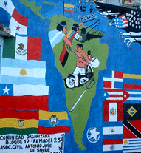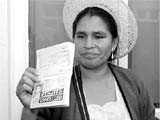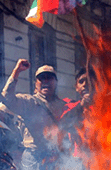
Articles by Benjamin Dangl


Latin America’s Leftist Shift: Hopes and Challenges
Within the last six years in

In the Name of the War on Terror: Bolivian Human Rights Leader Barred from Entering the U.S.
Leonida Zurita Vargas, a Bolivian coca farmer organizer and alternate Senator, was planning to be in the US right now as part of a three week speaking tour on Bolivian social movements and human rights.This tour would take her to Vermont, Harvard, Stanford and Washington DC. However, upon checking in at the airport in Santa Cruz, Bolivia on February 20th to fly to the US, she was informed her ten year visa had been revoked because of alleged links to terrorist activity.

Fireworks, Politics and a Globalized Stew
Fireworks are exploding everywhere. The Caracas baseball team won a key game and they’ll now go on to final rounds, playing teams from various countries in the region. People have been driving around the city waving the team flag, honking horns and screaming out windows.
It’s the last day of the world social forum. Tents are being packed up and the streets are beginning to look eerily vacant. Buses full “foristas” roar off toward the airport. In many ways, it’s been a college semester smashed into a week. So much information has been floating around, so many panels listened to. However, just as it was at last year’s forum, the best part of the week wasn’t the panels themselves, but meeting like-minded people from all over the world. Meeting people in person whom I had only known through cyber space has been great.

Alive in Baghdad: An Interview with Brian Conley
Benjamin Dangl: How did you get involved in journalism and journalistic film making?
Brian Conley: Well, I initially intended to study history and political science in college. When I arrived there, however, I quickly decided that art and, particularly film, were very good ways to influence the public and to talk about important historical events that might not otherwise be learned or discussed in the public discourse.

Bolivia’s Trial By Fire
After winning a landslide election victory on December 18th, Bolivian president-elect Evo Morales announced plans to nationalize the country's gas reserves, rewrite the constitution in a popular assembly, redistribute land to poor farmers and change the rules of the U.S.-led war on drugs in Bolivia. If he follows through on such promises, he'll face enormous pressure from the Bush administration, corporations and international lenders. If he chooses a more moderate path, Bolivia's social movements are likely to organize the type of protests and strikes that have ousted two presidents in two years. In the gas-rich Santa Cruz region, business elites are working toward seceding from the country to privatize the gas reserves. Meanwhile, U.S. troops stationed in neighboring Paraguay may be poised to intervene if the Andean country sways too far from Washington's interests. For Bolivian social movements and the government, 2006 will be a trial by fire.
